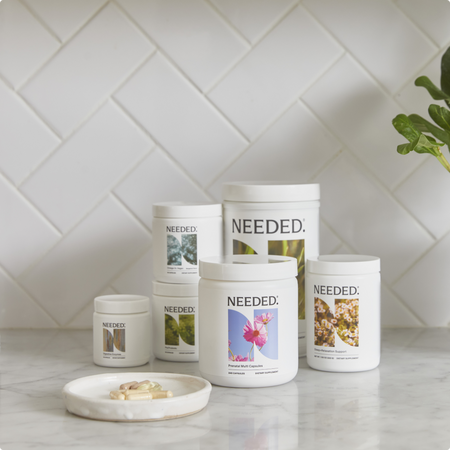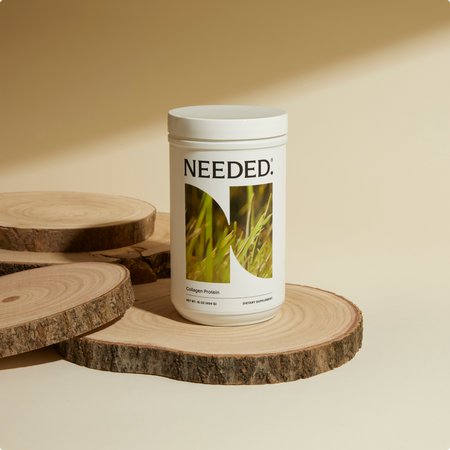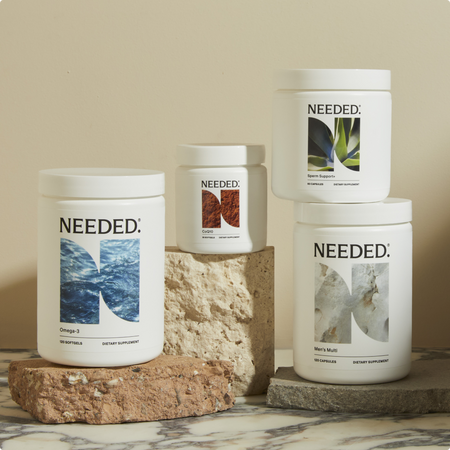The Facts About Gut Health & Pregnancy
Gut Health and Pregnancy isn’t just a wellness trend; research shows it’s a critical part of your prenatal health. When we talk about gut health during pregnancy, we’re referring to how well your digestive system and the trillions of microbes that live in it (your gut microbiome) are functioning. A balanced gut is crucial for optimal digestion, nutrient absorption, and immunity, all important for a healthy pregnancy.
Pregnancy naturally transforms the gut environment. Primarily driven by hormones, your immune and digestive systems undergo changes, which can slow digestion, alter appetite, and impact the maternal gut microbiome. These changes are completely normal, but keeping your gut in balance can make a big difference in how you feel day-to-day.
Your gut microbiota may even shape your baby’s immune system, digestion, and early development. This means caring for your gut isn’t just for you; it’s for your baby as well.
Why Gut Health Matters in Pregnancy
The pregnancy gut microbiome comprises trillions of microorganisms that help regulate your immune system and digestive processes. They all work together, ensuring your body absorbs the nutrients needed for your baby’s growth.
The minuscule bacteria in your gut adapt throughout pregnancy, helping your body store energy, manage inflammation, and even prepare for labor by influencing key hormones and immune responses.
What’s more, emerging research points to a strong link between a balanced maternal gut, birth outcomes and your baby’s long-term health.
How Pregnancy Changes the Gut Microbiome
Throughout your pregnancy, your body changes and adapts to support your baby’s growth, and your gut isn’t any different. The changes mostly take place during the first and third trimesters:
- Your placenta produces special anti-inflammatory substances that prevent your immune system from mistaking the growing baby for a foreign object or a threat
- Higher levels of estrogen and progesterone can slow digestion, allowing our body more time to absorb vital nutrients
- Certain bacteria tied to better energy storage increase as well, ensuring you and your growing baby have enough energy
- In the third trimester, levels of pro-inflammatory cytokines (small proteins) increase to help trigger labor
Some of these changes are influenced by diet, stress levels, environment, genetics and other factors. For the most part, your gut will continue to adapt to support your evolving needs, but you can also help by adopting a gut-friendly diet and making other lifestyle changes.
Benefits of a Healthy Gut During Pregnancy
The benefits of gut health during pregnancy cannot be overstated. Pregnancy can be physically and emotionally exhausting. There’s evidence that maintaining optimal gut health can help your physical and psychological health. For your baby, optimal gut health can help them develop a strong gut, which is crucial for early immunity and nutrition.
For Mom
- Better digestion: Constipation is a common issue during pregnancy; a well-balanced gut can help reduce that, along with bloating and heartburn
- Reduced risk of pregnancy complications: Maintaining gut balance may lower the likelihood of gestational diabetes, preeclampsia, and excessive weight gain
- Enhanced mood and stress regulation: Through the brain-gut axis, a healthy microbiome can positively influence mood, sleep, and resilience against prenatal stress.
For Baby
- Stronger immune system: The maternal microbiome can help “train” the baby’s developing immune system before they’re born and perhaps even into early childhood.
- Reduced risk of infection: A healthy gut barrier helps prevent harmful bacteria or toxins from reaching the placenta or amniotic fluid.
- Lower risk of chronic illness: Research suggests that babies born to mothers with balanced gut health may have a lower likelihood of developing allergies, obesity, or metabolic disorders later in life.
Risks of Poor Gut Health During Pregnancy
Poor gut health during pregnancy can affect more than digestion; it can influence your health and your baby’s development. Unbalanced microbiota, a condition called gut dysbiosis, can lead to a host of issues:
- You may experience an increase in uncomfortable symptoms like bloating, constipation, and nausea
- Chronic inflammation linked to gut dysbiosis in pregnancy may contribute to serious complications such as gestational diabetes and preeclampsia, conditions that impact both maternal and fetal health.
- Inflammation can also negatively affect the placenta, reducing nutrient and oxygen flow to the baby and raising the risk of restricted fetal growth or preterm birth.
Additionally, poor gut health can hinder nutrient absorption and weaken your immune system. Aside from physically feeling worse, poor gut health can have some serious consequences during pregnancy.
How to Support Gut Health While Pregnant
Your diet and other lifestyle habits can significantly impact your gut health, which is excellent news since adding a few gut-friendly foods (and removing others) can make a substantial difference in how you feel. Below are a few tips to help with pregnancy gut health.
Hydration
Water keeps things moving, and your hydration needs are much higher during pregnancy, so it’s crucial you’re getting 8-12 cups (64 to 96 ounces) of water daily. You don’t have to limit yourself to plain water; low-sugar juice, decaffeinated tea, and even a fun, sparkling electrolyte mocktail are all options!
Pay Attention to Your Diet
You’ve probably heard it a ton of times already, but what you eat is so important during pregnancy. You don’t need a special diet, just a good mix of fruits and vegetables, lean protein, and starches that slowly release energy (i.e., those on the lower end of the Glycemic Index (GI)).
It’s also best to limit or avoid refined carbohydrates and excess sugar, both of which can trigger harmful inflammation.
Add Gut-Healthy Foods and Supplements to Your Daily Diet
In addition to a diet filled with greens, protein, and energy-boosting carbs, you may want to add some gut superfoods to your diet:
- Fiber: Only 5% of American adults meet their RDA for fiber every day. Yikes. Fiber isn’t just beneficial for digestion; it helps keep you fuller for longer, and certain soluble fibers even act as prebiotics.
- Fermented foods: Head to the dairy aisle and grab yogurt and kefir, both of which are packed full of beneficial bacteria strains. Can’t do dairy? See how you feel about kimchi, a spicy fermented cabbage popular in Korea (just be careful, spicy foods can exacerbate heartburn!)
- Probiotics: Consider adding a probiotic tailored to pregnancy to your daily wellness routine to support both your and your baby’s gut health.
All of the above should, of course, be part of a larger, healthy diet where you obtain the majority of your nutrients from the foods you eat.
Manage and (if Possible) Reduce Stress
Chronic stress can be detrimental to your gut health. Chronically high levels of cortisol, the “stress hormone,” can alter gut bacteria and slow down motility (how your digestive system works). Find ways to manage your stress, such as taking a social media or news break, adding gentle yoga or meditation, and identifying stressful triggers so you can create a defense plan ahead of time.
Healing Your Gut While Pregnant
If your gut health isn’t optimal at the moment, whether you’re currently pregnant or trying to conceive, that’s ok, the right diet and lifestyle changes can help. In addition to diet, stress management, and hydration,
[H2] Frequently Asked Questions
Can I Take Probiotics While Pregnant?
Yes—many studies show that certain probiotic strains are safe and can support digestion, immunity, and overall gut balance during pregnancy. Always check with your healthcare provider before starting any supplement. Needed’s probiotic has
How Does My Gut Health Affect My Baby?
Your gut microbiome helps shape your baby’s developing immune system, digestion, and even long-term health. A balanced gut supports better nutrient transfer and may reduce the risk of allergies or metabolic issues later in life.
What Foods Help Gut Health During Pregnancy?
Fiber-rich foods like oats, beans, berries, and leafy greens, along with fermented foods such as yogurt, kefir, or pasteurized sauerkraut, nourish healthy gut bacteria and improve digestion.
Does Your Gut Health Affect Pregnancy?
Absolutely. Good gut health supports hormonal balance, nutrient absorption, and immune regulation, while poor gut health during pregnancy may increase the risk of inflammation, gestational diabetes, or preeclampsia.
What Are the Symptoms of a Gut Bacteria Imbalance?
Common signs of gut dysbiosis in pregnancy include bloating, constipation, fatigue, food sensitivities, and frequent digestive discomfort.
How to Clean Out the Gut While Pregnant?
Avoid harsh cleanses or detoxes; they can be unsafe during pregnancy. Instead, focus on natural support through hydration, high-fiber foods, gentle movement, and probiotic-rich options that promote a healthy, balanced microbiome.
Summary and Key Takeaways
The gut microbiome plays a vital role in supporting digestion, immunity, hormone balance, and your baby’s development. A thriving microbiome helps regulate inflammation, improves nutrient absorption, and promotes healthy weight gain—all essential for a strong pregnancy.
Supporting gut balance doesn’t have to be complicated: eat a fiber-rich diet with plenty of fruits, vegetables, and whole grains; include safe, fermented foods or probiotics; stay hydrated; move regularly; and manage stress and sleep. These small, daily habits can go a long way toward nurturing both your body and your baby from the inside out.















